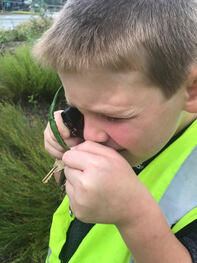
Insects are so cool! Have you ever taken the time just to watch them? It’s incredible how they instinctively know what to do and how to do it. They’re so much more than just a bunch of bugs flying or crawling around, spreading pollen, and sipping nectar. Pollinators are some of the hardest working creatures on this planet. These lovely bees, butterflies, beetles, moths, bats, hummingbirds, ants, etc., work tirelessly without expecting anything in return, except for a pesticide-free habitat to call home.
Some have specialized jobs to do. For example, Bumblebees and other native bees use a technique that honeybees and other insects could never begin to master. Vibrations from the bees’ unique style of Buzz Pollination bounce pollen from the hard to reach anthers of tomatoes, eggplants, kiwis, and blueberries onto their fuzzy bodies to spread onto neighboring plants. So, smile at that curious bumblebee hovering in front of your nose instead of chasing him away.
A number of insects and their larvae carefully patrol their turf, hunting down unwanted pests and dispatching them to the great beyond, while others become the food that keeps the cycle going.
Through observation, researchers have discovered a lot about the natural world, but so many mysteries remain unsolved. Lucky for us, anyone is welcome to join this quest for knowledge through citizen science. There’s no need for college degrees to participate. For the most part, it’s free of charge, and there’s a vast variety of projects to choose from – something is bound to grab your interest!
Have you ever wished to do something worthwhile to benefit humanity and the environment? You can, and the Great Sunflower Project is the perfect place for any novice citizen scientist to begin. The materials you’ll need and the steps to prepare are outlined and explained before you launch into any tasks.
The work is straightforward. All you have to do is watch a plant, record the pollinators, and report your findings online. It’s easy, yet very rewarding when you think of the significant role you play in identifying where pollinators are declining.
From there, the sky’s the limit.
- Volunteers are needed to solve the mystery of where wild, migratory western monarchs hide during February, March, and April. The Western Monarch Mystery Challenge is a way for Californians to conserve and restore the monarch migration in the West.
- You and the kids can take a Cicada Safari, where you go in search of cicadas, photograph them with your phone, and submit the data for verification.
- Remember the carefree times when you chased fireflies around the backyard on summer evenings? You can relive that memory and combine it with scientific research by spending 15 minutes per night counting the male/female fireflies in your yard. Firefly Watch is another fun project for the family to do together.
- Also concerning fireflies, the Xerces Society is searching for volunteers for their Firefly Atlas. The U.S. and Canada have at least 173 species of lightening bugs. One-third of which may be imperiled and half are data-deficient. Some species live in specialized areas, others are threatened by habitat loss, pollution, climate change or pesticide use. This project will chart where they are found and help in recovering the dwindling populations.
- Another Xerces Society citizen science project is the Bumble Bee Atlas. This task gathers data to track and conserve bumble bees. Widespread participation is needed to obtain the large amount of information they need to better understand bumble bees and implement effective bumble bee conservation.
In citizen science, ordinary people contribute to scientific research to better understand and solve environmental and social issues by researching, collecting, and analyzing data, interpreting results, making discoveries, and developing technologies and applications.
The term citizen science only dates back to the 1990s. Still, the role played by residents in recording scientific data can be traced to ancient times when the early Egyptians kept careful records of nearly everything, including the annual flooding of the Nile River and the resulting variations in harvests. Likewise, Chinese farmers have kept track of the destructive migratory locusts for the past 2000 years and will continue as long as necessary.
So the concept isn’t new, but the scale and worldwide impact of the scientific research has reached phenomenal proportions. Having a diverse group of participants conducting research in differing regions and conditions makes the results more representative of the whole picture. Plus, having many people working on the project concurrently shortens the time needed to complete the study. And it’s not only the scientific community that benefits from the collaboration. Data suggests that participating in scientific research helps improve literacy and understanding in both adults and children. It helps develop critical thinking skills applied to daily activities and broadens interests in new subjects people would have never considered investigating before.
The best part is that it’s a fantastic way to spend time with your friends or family doing something you can all enjoy and learn something new at the same time.
Go for it!
 RSS Feed
RSS Feed

